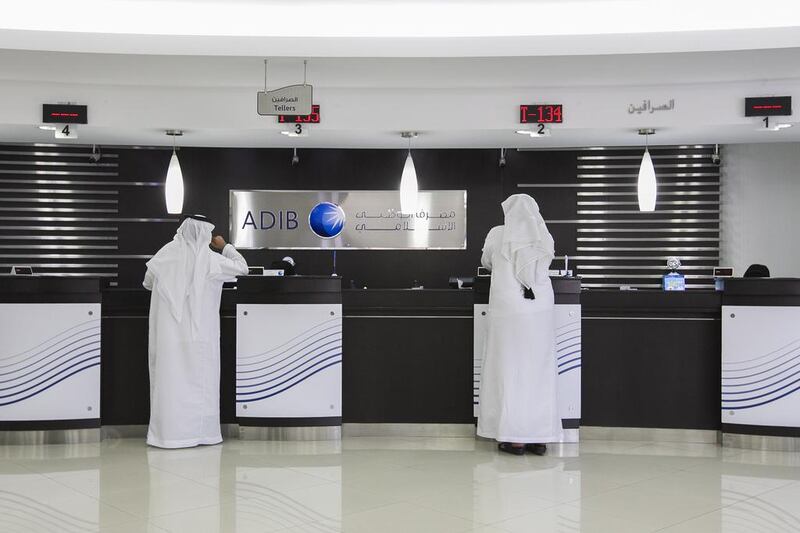As banks increase lending at its fastest rate since before the 2009 downturn, a credit bureau due to launch this month will aim to cut the risk of them falling prey to another debt crisis.
Al Etihad Credit Bureau will initially focus on providing banks with reliable credit data about consumers, allowing them to make informed decisions about who they lend to.
By next year it will provide the same information about companies.
Regulators and banks are in agreement that in the long term the bureau will improve the resilience of the financial system. By encouraging more prudent borrowing practices, the bureau’s presence should help to stop the sort of lending free-for-all prior to the Dubai 2009 debt crisis that gave scant regard for the ability of an individual to make repayments. In the long run, that should help support the economy through a more sustainable credit cycle.
But in the short term there are concerns the move could threaten to stymie a fledgling recovery in credit growth. Total lending rose by 9 per cent last year to reach Dh1.29 trillion, its fastest growth rate since 2008, when it reached 41 per cent, Central Bank data shows.
“There could be an impact on credit growth in the near term as banks discover that certain customers are over-indebted and that they cannot top up or issue new loans to these customers,” says Shabbir Malik, a Dubai-based analyst at EFG-Hermes, an Egyptian investment bank.
“This problem could be particularly acute for banks where retail loans make up a large proportion of the loan book.”
A report by EFG-Hermes last month highlighted Abu Dhabi Islamic Bank (ADIB) as among the most vulnerable. The bank held the most exposure to the retail sector, the report said.
ADIB has already taken steps to bolster its safeguards ahead of the bureau’s launch.
It announced in its first quarter financial results that it had built provisions of 1.62 per cent of total customer risk-weighted assets, above the Central Bank's minimum requirement of 1.5 per cent. It has a further Dh400 million in reserve in case of any extra losses. Other banks have taken similar steps.
Some bankers have expressed worries about the bureau's immediate launch, too. AbdulAziz Al Ghurair, the chief executive of the Dubai-based lender Mashreq and the chairman of the UAE Banks Federation, said in September that once the bureau went live "banks will stop lending" for six to 12 months as they discovered how many customers had excessively borrowed. Still, Mr Al Ghurair and the federation remain supporters of the bureau.
But the concern surrounds the process of transition between two very different lending regimes. Under the current system, banks have no way to check on a potential customer’s borrowing history with other lenders. The new regime will give lenders credit information from across the financial sector on potential borrowers dating back two years.
“There is no system to stop a consumer taking various copies of a salary letter and getting multiple loans from different banks,” says Timucin Engin, the director of financial institution ratings at Standard & Poor’s ratings agency. “Banks will be able to see consumers’ exposure, so will be able to adjust their lending behaviour.”
Mr Engin is sceptical the regime change will lead to a sudden halting of lending in the short term. Others share a similar view.
“We don’t see the credit bureau as a drag to retail credit growth, particularly given the tighter lending criteria and more credit underwriting vigilance adopted by UAE banks since 2008,” says Alia Moubayed, the director and head of research for Mena at Barclays.
The Government and banks have already paid a heavy price over consumers becoming entangled in debt. In December 2011, the Ministry of Presidential Affairs launched the Debt Settlement Fund with an initial budget of Dh10 billion to help to bail out indebted Emiratis, often with multiple credit cards and loans.
Banks have also had to set aside billions of dirhams since the 2009 crisis to safeguard themselves against soured loans, some relating to consumers.
But in recent quarters, lenders have started to see the light at the end of the tunnel. Non-performing loans peaked in the final quarter of last year for the first time since 2007. As a recovery in consumer confidence has gathered pace, many banks have put more focus into the retail space to diversify their operations away from lending to government-related corporates, a sector that has been subject to stricter borrowing rules in the past year. The bureau’s launch should instil banks with the confidence to continue consumer lending, while allowing them to be more selective about who can borrow from them.
In turn, borrowers with a clean credit history should be able to benefit from more favourable financial terms — even when interest rates begin to rise from record lows.
And in the long term it should also help to stimulate credit growth.
Evidence from countries with well-established credit bureaux shows their presence has a positive boost on lending. Singapore launched a credit bureau in 2002. Since then, the average monthly credit card balance per consumer has jumped by 54 per cent from US$3,275 to $5,034 in 2012.
But despite the rise, the average default rate for credit cards has dropped from 2.4 per cent of credit cardholders in 2002 to 2.07 per cent in 2012.
Experts say the UAE will benefit in a similar way.
“Reliance on high-quality risk data will speed up the approval process time, which in turn, will improve market efficiency and increase lending volumes, to support a growing UAE economy,” says Austin Rudman, a partner in Dubai at KPMG, a professional services firm.
“The credit bureau will strengthen the economy and the financial system.”
tarnold@thenational.ae
Follow us on Twitter @Ind_Insights





